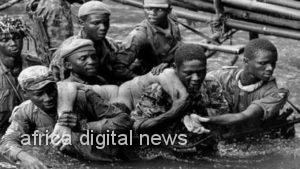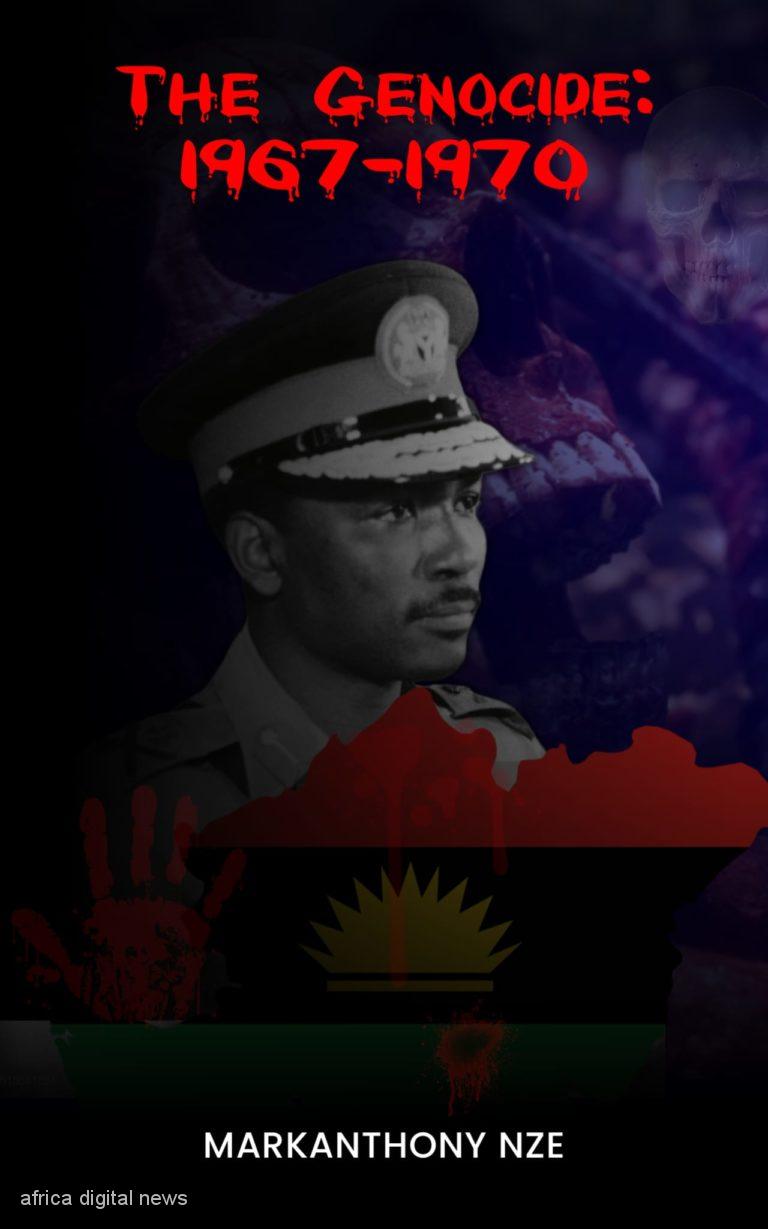Healing will always naturally come where there is justice and hence whenever justice is denied, any efforts made at chasing peace and reconciliation will thus always end up an exercise in futility. The question is; does Nigeria want genuine healing that can help it eventually lay events of the last 63 years to rest? The answer is simply embedded in her body language which is a screaming No.
The avoidable deaths of more than three million people as a result of the brutal genocide which took place between 1967 -1970 is one that can never be swept under the carpet. This genocide has continued to be referred to as ‘civil war’ for political reasons which is quite unfair but the truth, they say cannot be hidden forever. With fearless people like Prof. MarkAnthony Nze ready to take the bull by the horn and call a spade, a spade, it is only going to be a matter of time before justice will eventually be served. Prof. Nze has already etched his name in the sands of time through his classic book which he christened ‘The Genocide’ which is an unbiased view of what really went down within that time.
A trip down memory lane will help us remember that sometime in 1967, the then-military governor of the Eastern Region of Nigeria, Colonel Emeka Ojukwu, declared the region as the independent Republic of Biafra following major shifts. Most of the existing history tried to suggest that he took this action unilaterally, but the book by Prof. Nze has clearly corrected that wrong notion. That piece of information is quite incorrect. Four days before that declaration by the young Ojukwu, a consultative assembly made up of people in the 11 provinces of the Eastern region had by a majority voted to break away from Nigeria following the Federal Military Government’s reneging on the Aburi Accord of 5 January 1967, and the creation of three states out of the Eastern Region on 5 May 1967. Ojukwu was merely respecting the wishes of his people.
Biafra was a short-lived republic, eventually dying on 15 January 1970, and being reabsorbed into Nigeria after a violent genocide that lasted for 30 months and claimed over 3 million lives. On the African continent, only the Second Congo War which lasted from 1998 to 2003 claimed more lives. Sadly, this is the truth that Nigerian authorities have consciously made efforts not to discuss or make amends for. How then will justice happen?
The bulk of proper military action was fought between June 1967 and March 1968, and then in the last three months of 1969. The vast majority of that badly orchestrated genocide was a blockade that led to what is till today the worst case of deliberately imposed mass starvation in Africa, costing no fewer than three million lives. Yes, many people do not even know that the bulk of the people who died in Biafra was not killed by bullets but starved to death. How can a country do this to a group of people they were purportedly fighting to reabsorb back into its fold? Too many questions, and very few answers.
Read Also: Nigeria, A Banana Republic Under President Buhari
As carefully narrated by Prof. Nze in his book, the people of the breakaway state of Biafra were subjected to gross inhumanity, brutal annihilation, and gross genocide which had signs of intended ethnic cleansing written all over it. Their only crime was wanting out of a marriage that they didn’t even enter themselves. There simply wanted the right things to be done. There wouldn’t have been Biafra if Aburi was respected and implemented. There wouldn’t have been Biafra if the then federal government had the balls to end the mass pogroms of Igbos across the country. There wouldn’t have been Biafra if Nigeria was fair enough to allow the man from the Eastern region an opportunity to breathe like fellow countrymen and women.
As anticipated by the league of countries who ganged up against Biafra at that time, the young country tottered and collapsed, and was reabsorbed into Nigeria. Sadly, and perhaps even more profound is that until today, the Igbo people who were on the receiving end of that brutality are still treated with mistrust in Nigeria and have never been fully reintegrated. The facade of the 3Rs which were announced by the then Head of State, Yakubu Gowon has never seen the light of the day till date.
The official policy of ‘reconstruction, rehabilitation, and reintegration’ only survived on the notes they were printed on by Gowon. No one was ever held responsible for the pogroms that preceded the war and there have been no apologies. There was no Truth and Reconciliation-type mechanism to process the brutality of the war; there isn’t even a national museum or monument!
So, one would wonder, why do we still have cries for a restoration of the republic of Biafra today, despite the fact that the geopolitical factors that doomed that republic (no support from Cameroon to the East, and no support from the ethnic minorities of the old Eastern region) still exist?
We still have these cries because Nigeria has failed to win the argument. Nigeria has failed to dispassionately study the problems and missteps that led to secession in 1967 with a view to not repeating them. Nigeria has failed to acknowledge that there was a major historical wrong in which an entire ethnic group was punished for the perceived sins of some of its sons. Nigeria has failed to bring justice for the grand theft that was the £20 settlement and the abandoned properties fiasco. These issues have let a wound fester. But, from the perspective of Prof MarkAnthony Nze, Nigeria keeps repeating the same mistakes every year, and Nigeria has refused to let justice prevail. Nobody has been brought to face justice and most of the principal actors in that genocide are still walking about freely today or are highly celebrated. Murderers like Murtala Muhammed have had the country’s most important airport names after them and even have their faces on the country’s currency. The then Minister of Finance, Obafemi Awolowo who supervised the mass murder of Biafrans through the instrument of an economic blockade is today smiling on an important currency note belonging to Nigeria while one of the oldest universities in the country still bears his name. Nigeria has always been known for pursuing ‘settlement’ among the big men who have either committed, or financed great crime, and the little man is left broken and bitter, to pass on this bitterness to his children.

That is the story of Nigeria. That is the story of Biafra. Many would say Ozoemena, Igbo for ‘may it not happen again’, but the truth is that as long as Nigeria refuses to acknowledge, even if just for the records, mass killings in Kano, Asaba, Onitsha, Ugep, Umuechem, Bakolori, Bauchi, Zango Kataf, Odi, Kaduna, Jos, Yelwa, Shendam, Maiduguri, Ogaminana, Potiskum, Wudil, Damaturu, Madalla, Okene, Kaduna, Zaria, Baga, Mamudo, Buni Yadi, Gwoza, Aba, Kajuru, and put a permanent black stain on the names of the perpetrators of these mass killings, the bitterness that will lead to more people wanting out of the unsuccessful marriage will always rear its head.
In conclusion, Nigeria can continue to downplay or try to subdue the stories of the atrocities that were committed by her soldiers in the Eastern region in those 30 bloody months but this will not continue to be the case. The truth cannot be hidden forever. Prof. Nze has given it a shot through his didactic revelations in ‘the Genocide’, others are coming and justice must be served. Those millions of people who were flushed out of the surface of the earth by Gowon and his bunch of genocidal maniacs will not go unpunished. Before posterity is allowed to take its course on them, they will be brutally confronted at the ICC. Justice is the minimum demand in this case and it must be served.










